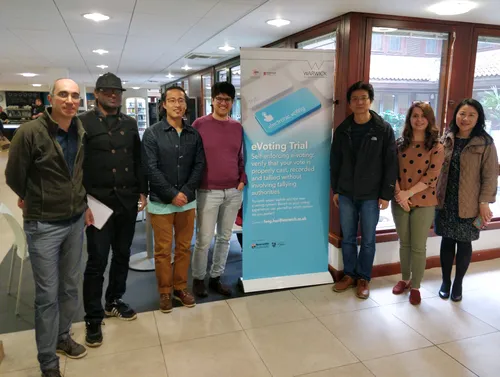Applied Computing News
Dr. Torsten Mütze joins the department as a new Assistant Professor
The Department is welcoming our new Assistant Professor Dr. Torsten Mütze, who will be associated with the Division of Theory and Foundations (FoCS) and the Centre for Discrete Mathematics and its Applications (DIMAP).
Before joining Warwick, Torsten held postdoctoral researcher positions at TU Berlin, Georgia Institute of Technology, and ETH Zürich. He obtained his PhD in Computer Science from ETH Zürich in 2011, under the guidance of Angelika Steger.
Talha Qaiser passes his PhD exam

Talha Qaiser, a PhD student in the Tissue Image Analytics (TIA) lab, successfully defended his PhD thesis titled "Topology and Attention in Computational Pathology" on Thu the 13th of June 2019. The thesis was supervised by Prof Nasir Rajpoot and involved collaborations with the University Hospital Coventry & Warwickshire (UHCW) NHS Trust (Prof David Snead, Dr Yee Wah Tsang), Department of Mathematics (Prof David Epstein), Warwick Medical School (Prof Paul Thornalley) and the Universities of Nottingham, Birmingham, Osaka and Hiroshima.
Warwick lead the first verifiable e-voting trial in the UK

Researchers from the Department of Computer Science, University of Warwick, joined by colleagues from Newcastle University and the University of York, led the first successful trial of an end-to-end verifiable e-voting system for polling station voting in Gateshead, Newcastle during the local elections on 2 May 2019. This trial was supported by the electoral service officials at the Gateshead council and was approved by the University of Warwick’s research ethics committee.
This is the first trial of a fully electronic voting system with end-to-end (E2E) verifiability for polling station voting in the UK. Being E2E verifiable, the system allows voters to independently verify if their votes are cast-as-intended, recorded-as-cast and tallied-as-recorded while preserving their privacy. By contrast, with paper ballots, voters must trust other people to record and tally their votes correctly, but they cannot verify this by themselves. The trialled e-voting system is the research outcome of an ERC starting grant, led by Professor Feng Hao from the Department of Computer Science. The prototype was developed under the support by Innovate UK and the trial was sponsored by the Royal Society.
On the election day, voters went to the Gateshead civic centre polling station to vote on paper ballots as usual. Upon exit from the polling station, they were invited to try a touch-screen based e-voting system for a mock election involving a set of dummy candidates. Voters were then provided with an anonymous survey form to indicate based on their voting experience, which of the two voting systems did they prefer. Nearly half of the voters at the Gateshead civic center polling station participated in this trial and provided many useful feedbacks. From the survey results, voters generally found the trialed e-voting system easy to use, and preferred it to paper ballots.
From Gateshead Council News, this is "a new system that could completely revolutionise the elections system". The Gateshead trial is also covered in the BBC News, University Press Releases, Webroots democracy, Government Business, Gizmodo, and ChronicalLive. A video demonstration of the trialled e-voting system is available on YouTube.

